ICSD likely to fill Board vacancy; choice uncertain
by Robert Lynch; August 30, 2024
If you wager on things like these, consider Moira Lang the odds-on favorite to return soon to her long-held seat on the Ithaca Board of Education. But don’t bet the ranch on it. The Ithaca Board—and Lang—were burned badly by the voters last spring, and since then, actions within the Ithaca City School District (ICSD) have become hard to predict. Filling a newly-found vacancy could become for the Ithaca board just another one of those modern-day can’t-guess moments.
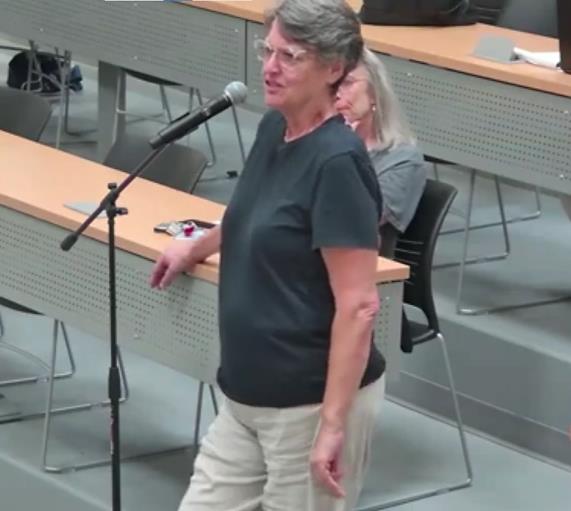
Earlier, at the Board of Education’s August 13th session, we’d first learned of colleague Katie Apker’s sudden board resignation. Apker didn’t attend that night. Another member revealed her colleague’s decision and offered a resolution of thanks. Apker, a Cornell educator, had served just a single year of her three-year term. No reason was then given for her departure.
Two weeks later, August 27th, the remaining school board members discussed how they might fill the Apker vacancy—or whether they should fill it at all. The only thing decided for sure that night was that there’d be no special election. And even that question never came to a vote. It didn’t need to, given a special election’s estimated cost. Board President Dr. Sean Eversley Bradwell said running an off-cycle round of voting could impose a $35,000-$40,000 burden on taxpayers.
“I’m opposed to a special election just because of my innate frugality,” Board member Jill Tripp remarked. No one disagreed with her.
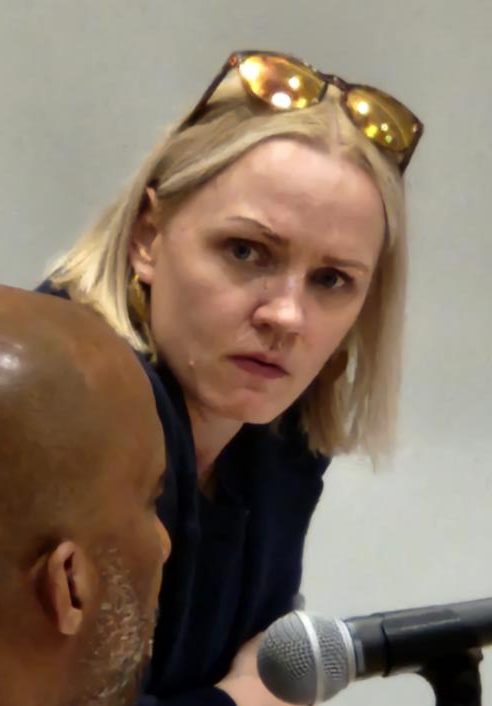
With a special election off the table, just two options remained: Either fill the Apker vacancy through appointment, or leave the seat vacant and live with a board of eight until next spring’s annual voting.
A plurality of the board—though not a clear majority—supported appointing a ninth member. Moira Lang, first runner-up in last May’s seven-way race for three board seats, became the instant favorite of two of those she’d sit beside. No one else’s name got mentioned.
“She has an incredible amount of experience that you can really utilize right now,” Enfield’s Karen Friedeborn said in praise of Lang’s credentials. Her comment arose during the meeting’s floor privileges. Friedeborn became the first to suggest Lang’s appointment.
Nonetheless, achieving consensus on how to handle the Apker vacancy proved elusive, agreement hobbled by empty chairs at the table. Two board members—Erin Croyle and Todd Fox—weren’t there. That left only four voicing clear support for appointing Apker’s successor. Two others suggested the vacancy remain. Moving forward even on procedure would take five votes.
“I am not worried about a 4-4 split,” Board President Eversley Bradwell said. “My worry is solely about the significant amount of work that it’s going to require for us to move things forward over the next months; so I am in favor of a ninth person,” he said.
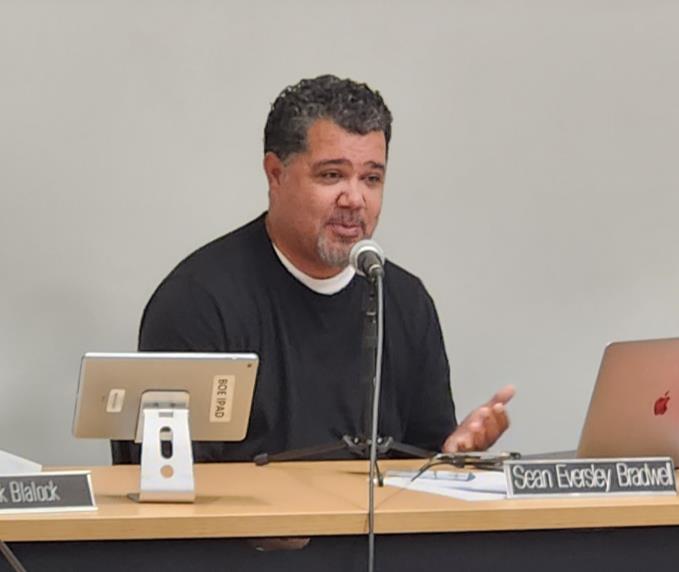
With either a direct endorsement or by clear inference, members Karen Yearwood and Garrick Blalock supported appointing Moira Lang. Both during and after the session, Eversley Bradwell also implied he’d back Lang, noting the long-time member’s “experience” and her endorsement by the Ithaca Teachers Association during the spring campaign.
A Board of Education member since 2015 and a former Ithaca teacher herself, Lang was voted off the board this year after she’d endorsed a nearly $169 Million school budget that carried an 8.4 per cent increase in the tax levy. More than 70 per cent of Ithaca’s voters had rejected the initial budget.
Incumbent Adam Krantweiss and newcomers Emily Workman and Todd Fox won the election in May. Fox came in third and bested fourth-place Lang by 419 votes. While Lang had strongly defended the rejected budget, Fox had openly opposed it. Another incumbent who’d supported the budget, Eldred Harris, came in last.
But Todd Fox was absent meeting night. Erin Croyle was also excused. Croyle had actually opposed the first budget put to voters on grounds it was too stingy. It’s easy to see how Croyle might support Moira Lang’s appointment. But even were Eversley Bradwell to join Yearwood, Blalock and Croyle, Moira Lang’s assured support would then only rise to four board members, not five.
“Personally, I would think I would like to see… all the people who are on the board be elected by the community,” Krantweiss argued. “I would prefer to keep it an eight-person board,” Krantweiss continued. “That way, everybody who’s on the board is elected by the full community, not the board.”
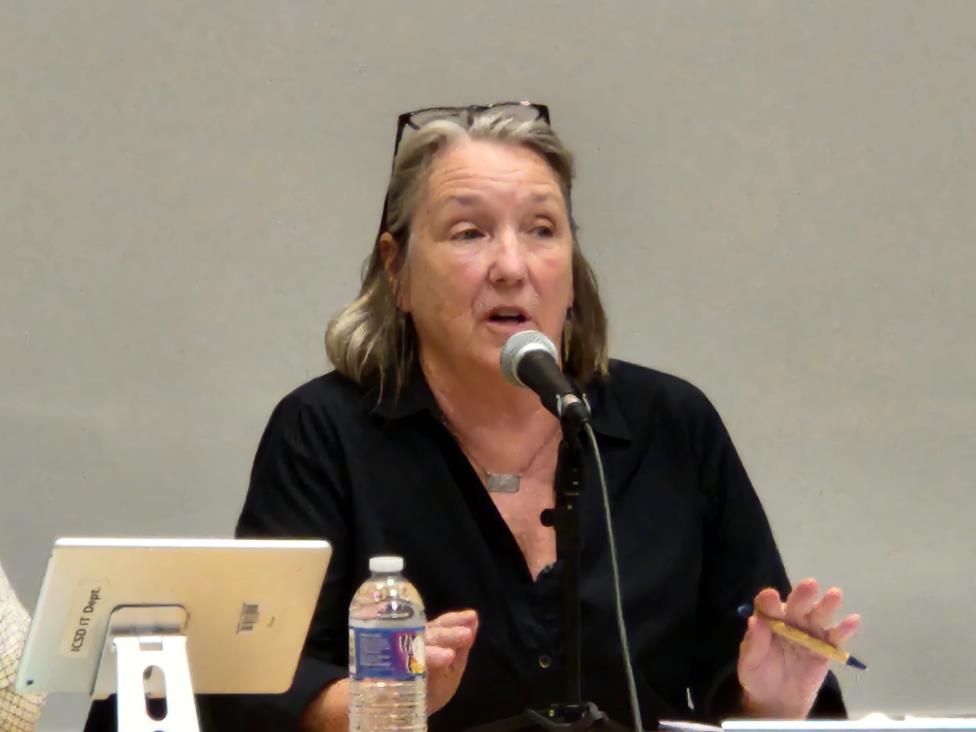
Yearwood and Blalock countered that inviting Lang to rejoin them does, indeed, reflect the public will. Had Apker resigned several months earlier rather than when she did, they said, voters would have elected four to their board, not just three; and Lang would have inherited Apker’s unexpired term.
“The community spoke at that time,” Yearwood insisted. Lang was their fourth choice, she reasoned.
“We would have had one more position to fill,” Blalock said in support of Yearwood’s logic. “The election would have filled it with the person with the next number of votes.”
But Krantweiss, a clinical psychologist with a Ph.D., sensed flawed reasoning. He equated the distinction to a physics problem. Putting a fourth position in play, he said, inserts a dynamic component to an otherwise-static election.
“If everybody got to vote for four people, we actually don’t know how the elction would have shaken out,” Krantweiss concluded, “because people might have voted differently, and the people who came in fourth, fifth, sixth and seventh might have been shuffled if everybody got to cast an extra vote.”
Jill Tripp, viewed by many as the taxpayer’s ally during the budget process, shared Krantweiss’ fear that attempting to appoint a new member would only reopen old wounds and never produce agreement.
“I share Adam’s concern about our ability to agree on a ninth member,” Tripp said, “and I would like that, obviously, to be unanimous. So I would probably come down on the side of continuing with eight, as awkward as that may be at times.”
Of the six members attending Tuesday, only Tripp and Krantweiss supported leaving the seat open. With three others—Yearwood, Blalock, and the Board President—favoring or leaning toward Lang—Emily Workman carved for herself a middle-position.
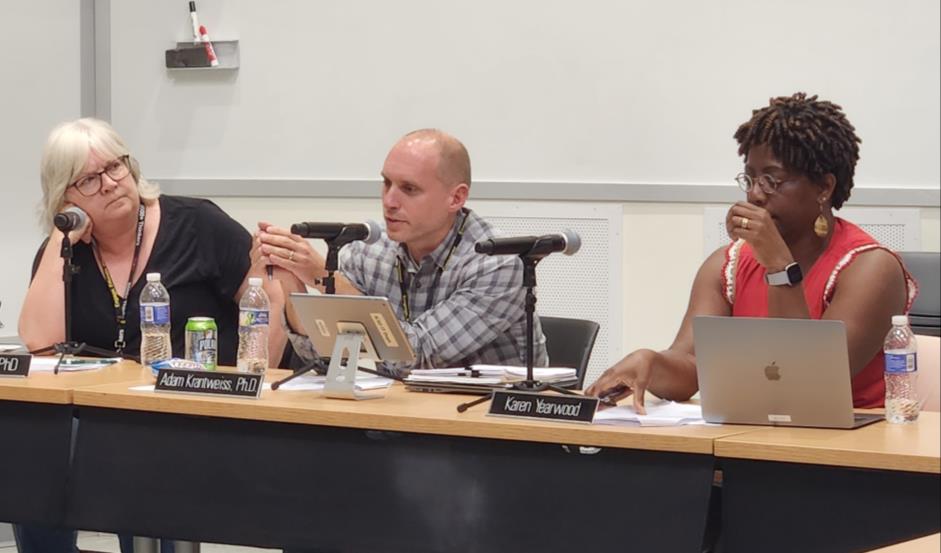
“It’s much better to have a nine-person board,” Workman acknowledged. “I also think that it doesn’t feel like the right choice to just go down the line to someone who lost the election,” she said.
At Tripp’s suggestion, members agreed to draft a future resolution that would endorse Yearwood’s proposal to go down the line to each successive loser in the May election and appoint the first of those former candidates who’d accept to serve. The resolution will likely see action in September. The school board meets September third, and then the tenth and the 24th.
After the meeting, Eversley Bradwell cautioned there’s no assurance this “down-the-line” vacancy-filling approach would secure a majority. Should it fail, he said, someone might offer a different idea.
Moira Lang has yet to commit publicly her willingness to rejoin the board. If she’d decline, former teacher and BOCES administrator Barry Derfel would stand next on the list.
As for Katie Apker’s reasons for ending her brief tenure, The Ithaca Times August 29th quoted a statement in which she cited “recent shifts in my personal and work obligations.” Apker gave no indication that politics played a role.
“I am disappointed not to be able to continue, but have great respect for the remaining members of the Board who continue to serve our Ithaca community,” Apker wrote the Times.
One can draw rough parallels between the dilemma that now faces the Ithaca Board of Education with that which the Enfield Town Board confronted three years ago when the post of Town Supervisor fell vacant.
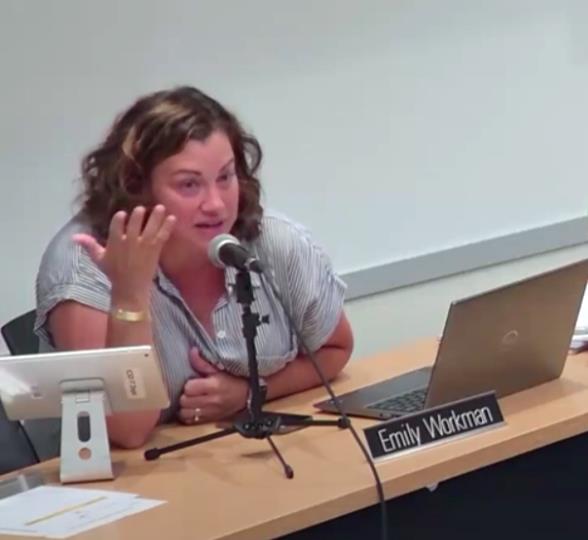
Back then, two of those on a member-gutted, three-person Town Board supported appointment of former Councilperson Stephanie Redmond as Supervisor. The third member (this writer-Councilperson) wanted to let the voters decide at the ballot box. Eventually all three voted to elevate Redmond so as to avoid crippling Enfield’s governance and throwing its future to the courts.
Of course, the Ithaca City School District’s impending decision carries far less drama. The school board can easily continue with eight members, just as it did two years ago after a similar resignation.
Nevertheless, just as with Enfield’s best-forgotten morass, politics can intrude. Moira Lang supported the initial budget. Voters rejected both the budget and also her. Were Lang appointed now, budget critics could perceive it as a sneaky end-run to undo a course correction they’d demanded and to bring back someone from ICSD’s “old guard” when fresh blood and a new direction is what they wanted.
It’s why appointment of Lang—or anyone else, for that matter—to fill the Katie Apker vacancy takes on elevated importance.
“It’s clear that we probably will not come to a consensus,” Board President Eversley Bradwell conceded. “But the question is, can we find a path forward.”
###

